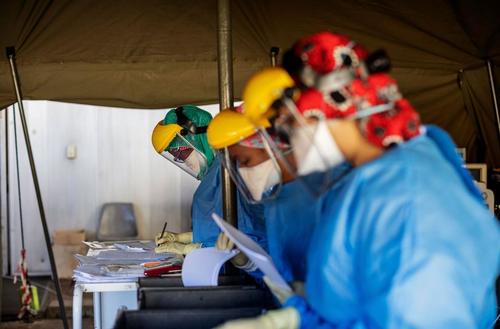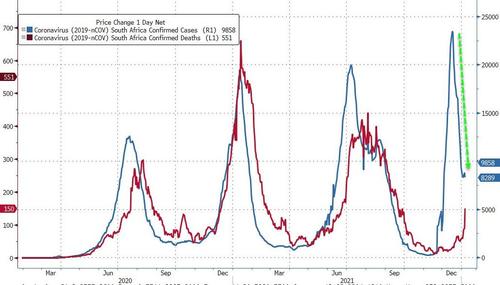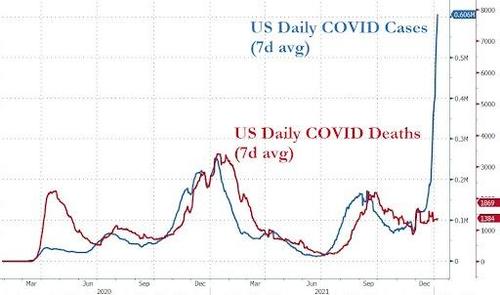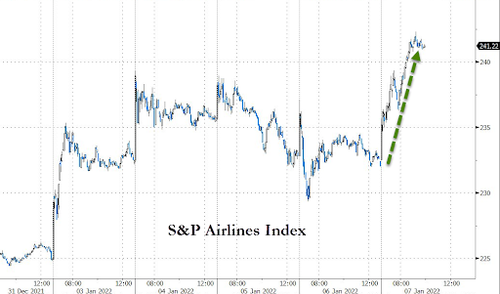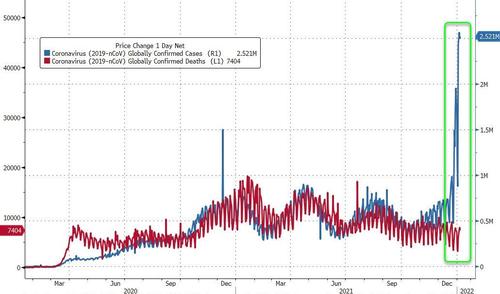South African Researchers Say Omicron Might Mark The End Of COVID Pandemic
In late November, as the early details of the South African variant emerged (more transmissible, and “extremely mild”), we noted that this “could be a blessing in disguise as it pushes out the much more dangerous (and more stable) delta strain,” and could mark the beginning of the end of the global fearmongering over a virus that over 99% of the infected are expected to survive.
And now, a team of researchers from South Africa confirmed Friday that omicron might mark the end of the COVID pandemic (before SARS-CoV-2 simply becomes another endemic, largely seasonal sickness), shrouding the present global surge in a patina of optimism.
To wit, a study of patients infected with COVID at a large hospital in Pretoria, the city where the first outbreak of the omicron variant was recorded, revealed a short-lived wave that moved with “unprecedented speed” and caused much milder illness than earlier strains.
“If this pattern continues and is repeated globally, we are likely to see a complete decoupling of case and death rates,” the researchers said.
And for the sickest patients, the study showed that just 4.5% of patients hospitalized with COVID died during the current wave compared with 21% in earlier waves, according to a statement on the website of the South African Medical Research Council. What’s more, this time around, fewer people were admitted to hospital ICUs, and hospital stays were “significantly shorter.” Initially, the rate of admissions climbed rapidly, but it began to decline within 33 days of the first omicron admission analyzed. A snapshot of patients in the hospital on Dec. 14 and 15 showed that almost two-thirds of those infected with COVID had been admitted for other reasons (raising further questions about how many of the deaths they reported should really be considered “COVID deaths”.
Ultimately, the study at Biko analyzed records of 466 patients from the current wave and 3,976 from previous waves of the pandemic. It also found the following, according to Bloomberg:
-
Hospital stays averaged 4 days compared with 8.8 in previous waves
-
The mean age of those admitted was 39 compared with almost 50 in earlier waves
-
Admissions to intensive-care units dropped to 1% of patients from 4.3%
-
Admissions peaked at 108 compared with 213 during the delta wave
Now that cases are plunging in South Africa, the researchers were able to confirm that the omicron wave had “a lower admission per case ratio, lower death rate and lower rates of admission to the ICU compared to previous waves.”
The researchers at the Steve Biko Academic Hospital in Pretoria said this behavior could be a sign that the pandemic is coming to an end.
That suggests “omicron may be a harbinger of the end of the epidemic phase of the Covid pandemic, ushering in its endemic phase.”
Think about it. All these people who are sick right now (it seems like practically the entire world has fallen ill with COVID over the past month, whether they had been vaccinated or not) will emerge with more antibodies and more natural protection that humans have needed to build in order to protect themselves from the virus long term.
Just take a look at COVID cases vs. deaths in the US; while the number of people sickened and calling out of work has created congestion across the economy (and forced hospitals in some states to turn to the National Guard for assistance), far fewer people are dying due to omicron, which is believed to be the variant behind nearly all of the new cases being diagnosed in the US, and elsewhere.
Airline stocks in the US are now headed for their best week since November thanks to the newfound optimism.
Data from South Africa, the first country to report the arrival of omicron, is being closely watched by the rest of the world for any insights into how the omicron wave might pan out. As we noted a week ago, South Africa dialed back its COVID restrictions after new cases cratered.
All of this supports what the WHO and its leader, Dr. Tedros Adhanom, said about booster shots. While President Biden and the CDC open the door to second booster jabs (the CDC just cut the recommended time between shots to 5 months from 6), the WHO has warned against it, saying shots should first go to the developing world, and that no country could “boost” its way out of the pandemic.
Although if the South Africa data is any guide, pretty soon they won’t have to.
Tyler Durden
Fri, 01/07/2022 – 14:01
via ZeroHedge News https://ift.tt/3HLfkdi Tyler Durden
